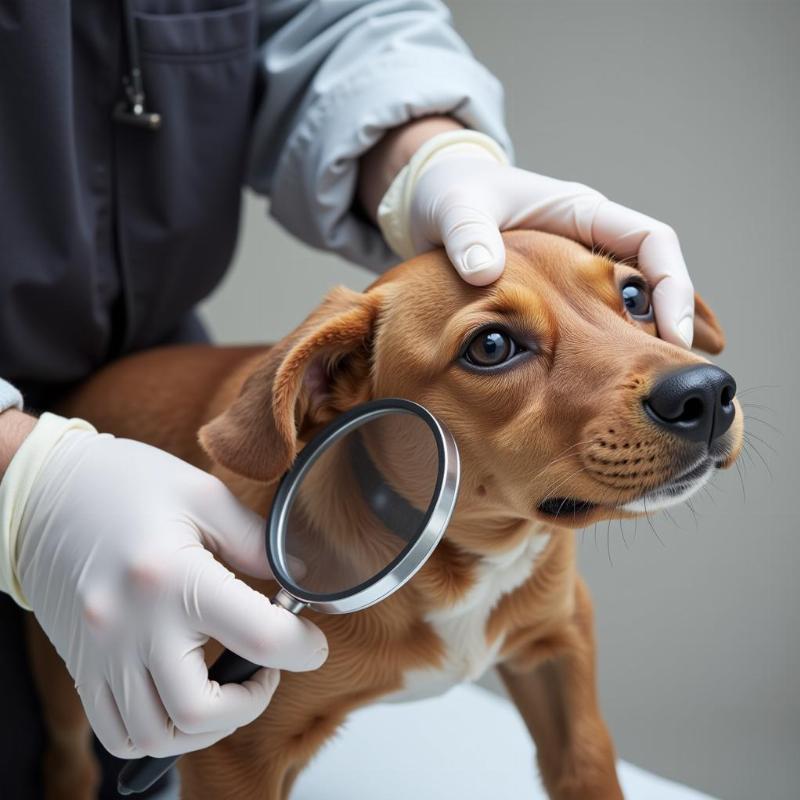Finding small black insects on your dog can be alarming. What are they? Are they harmful? This guide will help you identify common small black insects that infest dogs, understand the risks they pose, and learn how to effectively treat and prevent infestations.
Common Culprits: Fleas, Ticks, and Lice
The most common small black insects found on dogs are fleas, ticks, and lice. While they might look similar at first glance, they have distinct characteristics and require different treatment approaches. Fleas are tiny, wingless insects that jump. They’re dark brown to black, especially after feeding. Ticks, on the other hand, are arachnids, not insects. They can be various shades of brown and black, and they burrow into the skin to feed. Lice are small, wingless insects that crawl. They’re usually tan to dark brown but can appear black against light-colored fur.
The Risks of Infestation: Beyond the Itch
While the most obvious sign of these pests is itching, they can pose more serious health risks. Fleas can transmit tapeworms and cause flea allergy dermatitis, a severe skin condition. Ticks can transmit a variety of diseases, including Lyme disease, Rocky Mountain spotted fever, and ehrlichiosis. Lice, while less likely to transmit diseases, can cause intense itching, skin irritation, and hair loss.
Effective Treatment and Prevention Strategies
Several effective treatments are available to combat these pests. For fleas, topical and oral medications are commonly used. Tick prevention typically involves monthly chewable tablets or topical solutions. Lice can be treated with insecticidal shampoos or sprays.
Home Remedies and Natural Approaches
In addition to conventional treatments, some home remedies and natural approaches can help manage infestations. Regular bathing with a flea and tick shampoo can help reduce the number of pests. Adding apple cider vinegar to your dog’s water bowl is thought to deter fleas, but scientific evidence is limited. Diatomaceous earth, a natural powder, can be sprinkled on carpets and bedding to kill fleas, but be sure to use food-grade diatomaceous earth safe for pets.
When to Consult a Veterinarian
If your dog is experiencing excessive itching, skin irritation, hair loss, or other symptoms, it’s essential to consult a veterinarian. They can accurately diagnose the infestation and recommend the most appropriate treatment plan.
 Veterinarian Examining a Dog for Parasites
Veterinarian Examining a Dog for Parasites
Conclusion: Keeping Your Dog Pest-Free
Finding small black insects on your dog can be concerning, but with proper identification, treatment, and prevention, you can keep your furry friend comfortable and healthy. Regularly checking your dog for pests, using preventative medications as recommended by your veterinarian, and maintaining a clean environment can significantly reduce the risk of infestations. Remember, a pest-free dog is a happy dog!
FAQ
- What are the small black specks that look like dirt on my dog? These could be flea dirt, which is actually flea feces. If you wet the specks and they turn reddish-brown, it’s a sign of flea dirt.
- Can humans get fleas from dogs? Yes, fleas can bite humans, although they prefer dogs as hosts.
- How often should I treat my dog for fleas and ticks? Consult your veterinarian for the recommended frequency of treatment, as it varies based on the product and your dog’s individual needs.
- Are there any natural ways to repel ticks? Some essential oils, like citronella and lavender, are thought to repel ticks, but their effectiveness is not scientifically proven.
- What should I do if I find a tick embedded in my dog’s skin? Use tweezers to grasp the tick as close to the skin as possible and pull it straight out. Clean the area with antiseptic and monitor for any signs of infection.
- Can I use over-the-counter flea and tick medications? Yes, but it’s always best to consult with your veterinarian before using any new medication on your dog, especially if your dog has any underlying health conditions.
- How can I prevent fleas and ticks in my home? Regularly vacuuming, washing bedding in hot water, and treating your yard can help prevent infestations.
Related Articles
- flea medicine for dogs 100 lbs
- little black dots on dogs belly
- flea tick and mange treatment for dogs
- ukulele my dog has fleas
- can i vacuum my dog for fleas
Beautdogs.us is your premier online destination for comprehensive dog care information, breed-specific guides, and product recommendations. We cater to both novice and experienced dog owners, providing authoritative yet accessible content to help you navigate the joys and challenges of dog ownership. From health and nutrition to training and grooming, Beautdogs.us empowers you to make informed decisions for your canine companion. Contact us at [email protected] or +1 501-555-7529 for personalized advice. Visit us today at Beautdogs.us!